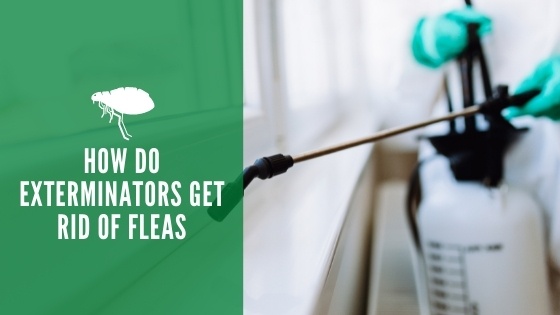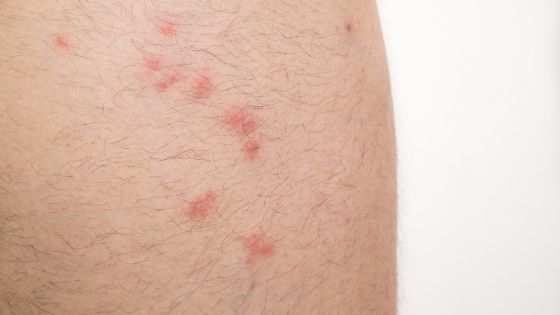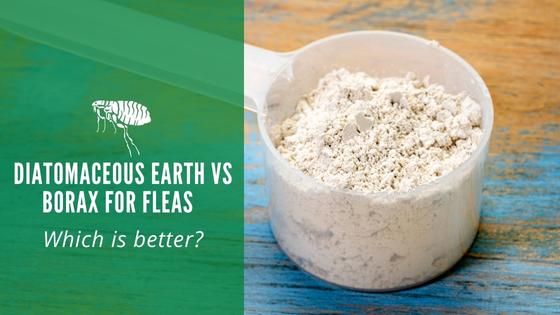Exterminator for Fleas: How do Exterminators Get Rid of Fleas?

An infestation of fleas can be a miserable experience for the people living in the home. Typically, fleas will get into a home due to a pet such as a dog or cat bringing them inside after romping in the yard. Some individuals try to get rid of the fleas inside using flea bombs or other remedies. The best way to ensure that all of the fleas, their eggs, and larvae are dead is to hire a local pest exterminator to perform the job for them.
Many wonder how these exterminators get rid of the fleas for good. Read on for some helpful information about ridding your home of fleas using a professional pest exterminator service.
How Long Does It Take to Get Rid of Fleas After Exterminator Treatment?
Most people are surprised to learn that even when an exterminator completes a flea treatment correctly, there is still a good chance this will not be the end of the fleas.
This is because fleas have a life cycle from eggs to adults of about 17 to 26 days inside a house. However, there may still be some fleas that will be present for up to 8 weeks if they are in the pupating or cocoon phase, which allows the flea to be essentially dormant appearing. This could last for up to 5 months.
So, after the flea treatment, the adult fleas should all be dead. The treatment should be repeated in approximately 7 to 10 days to catch any hatched since the first treatment. Sometimes, further follow-up treatments may be necessary to eradicate all the fleas for good.
Follow Your Exterminator’s Instructions for Best Results
Most professional flea treatments will require humans and pets to be outside the home for several hours following the treatment. Usually, this is a timeframe of 4 to 6 hours, depending on the type of insecticide being used and the degree of infestation.
It is common for professional flea treatments to remain undisturbed for 48 hours following the initial application. You will be advised not to vacuum or mop the floors to allow the pesticide to work its magic.
After waiting the prescribed after treatment time, the home should be aired out thoroughly by opening the doors and windows. People who have asthma or other breathing difficulties may have to take extra precautions.
Special care may be needed for young babies and older adults, especially if they have any chronic lung or other ailments, putting them at risk for a bad reaction.
Get Your Pet Treated for Fleas at the Same Time
Some people make the mistake of having their home professionally treated for fleas by an exterminator only to fail to treat their pet at the same time. This can reintroduce new fleas that will jump off the pet. Pet owners should follow their veterinarian’s advice regarding this pet flea treatment.
It is Usually Advisable to Treat Your Lawn, Porch, or Other Outdoor Areas Too
If your pet goes outdoors, you will likely need to treat your lawn, porch, or other areas outside where your pet hangs out. Make sure to trim back overgrowth, hedges, and tall grass where pests such as fleas and ticks will hide, waiting for a warm-blooded person or animal to be their next meal.
It is Necessary to Clean Your Home Following Flea Treatments Thoroughly
Pest exterminators strongly recommend that the homeowner deep clean their home after the prescribed wait period immediately following a flea treatment. Keeping your home free from clutter and dust can go a long way towards keeping any fleas or other pests at bay.
Fleas Often Become Worse Inside After a Pet Dies or Leaves
Many homeowners are surprised to find that their flea problem worsens after their pet dies or permanently leaves the premises. Since some fleas in their pupating or cocooned stages can live for several months without a meal as they are in an almost dormant state during this time.
Pay attention to areas where the pet slept or hung out inside the home. Fleas will be more likely to multiply in these areas. This includes porches, entryways, and basements. Cats are known to find out-of-the-way hiding spots making these areas at risk for a flea infestation.
How Much Does It Cost to Exterminate Fleas?
Many homeowners are concerned about how much a flea treatment will cost when performed by a professional flea exterminator. Expect to pay anywhere from $100 to $150 for an initial smaller area treatment for a small flea problem that is contained in a smaller area.
Most professional flea exterminating treatments will need follow-up treatments if the infestation has spread to other locations throughout the house. There will be additional fees and costs for these additional treatments. Most homeowners should expect to pay about $400 and up for a full-home multi-treatment for flea extermination services.
When to Call an Exterminator For Fleas
Most pest exterminators recommend calling them sooner rather than waiting until the flea problem is a full-house infestation. Pet owners often try over-the-counter pest extermination sprays and smoke bombs containing chemical insecticides that may be all that is necessary if the flea problem is not too bad.
Fleas multiply rapidly with each day that passes with them inside your home. Many DIY or store-bought insecticide treatments are more dangerous to humans and pets than exterminators’ professional-grade flea treatments, so be careful if you decide to go this route.
If the first treatments fail, the pet owner should call the exterminator at that time to set up an appointment.
How to Prepare for Flea Treatments
There are a few things that the pet owner will need to do to prepare for the flea treatments. This is important to help ensure that the treatments will be effective.
Prepare for flea treatments by:
- Washing Pet Beds & Bedding in Hot Water or Destroy Them
- Vacuum, Sweep & Mop All Floor Surfaces and Carpets
- Vacuum Furniture Making Sure to Get Under the Cushions & Along the Seams
- Clear the Home of Clutter
- Safely Put Away All Food Items & Cover Surfaces Where Food Is Prepared or Wash Them Afterwards Carefully Before Using
- Be Sure to Vacuum & Clean Along Baseboards & Inside Closets Where Fleas Can Hide
- Give the Exterminator Room to Move Around Furniture During Treatment
- Plan to Have Pets & People Out of the House for About 4 Hours or as Directed by the Pest Exterminator
- Air-Out the Home by Opening Windows & Doors Before Allowing Family Members & Pet Inside
- Clean All Kitchen & Eating Surfaces
- Abstain from Vacuuming or Washing Floors as Directed by Exterminator
Final Thoughts
Pet owners should take steps to prevent fleas from taking up residence in their own comfortable homes. Keeping your home cleaned, treating your pet for fleas, and getting professional flea treatments by a professional pest exterminator can all keep these irritating pests from becoming a true infestation.
Click here to contact a local professional pest control service for more information regarding fleas and flea treatments.



